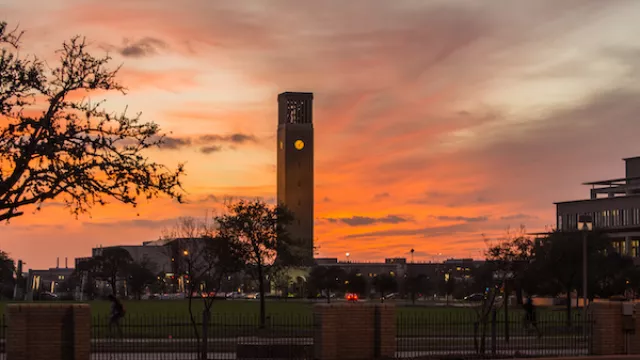Table of Contents
Free speech and football: FIRE's college football matchup of the week is Mizzou v. Texas A&M

Kevin Jairaj / Imagn Images
Texas A&M defensive linemen celebrate during the first half against the Arkansas Razorbacks.
It’s another all SEC matchup this week. No. 9 Missouri versus No. 25 Texas A&M, two teams that have amassed over 250 seasons of NCAA College Football combined. A&M has won three national championships, the last one in 1939. Mizzou has not claimed any titles.
These two teams are evenly matched on the football field — and when it comes to free speech on campus. In FIRE’s College Free Speech Rankings, Mizzou ranks 129 and A&M ranks 130, out of 251 schools. Both schools have an average speech climate, and about 3 in 5 students on each campus say that abortion is the most difficult topic to discuss.
Mizzou’s speech policies get a “yellow light” rating from FIRE, meaning it has at least one yellow light policy that restricts a more limited amount of protected expression or, by virtue of vague wording, can too easily be used to restrict protected expression. And when it comes to student surveys on campus, Mizzou scored highest when it comes to the administration's support for free speech, the campus community’s tolerance for conservative speakers, and student rejection of disruptive conduct to stop a campus speech. But Mizzou’s ranking on each component ranges from 64 to 74 — not particularly high or low.
Mizzou has also sanctioned two students for their protected expression since 2020. Both incidents involved expression about racial issues.

In the first incident, a high school senior admitted to Mizzou was seen in a video shared across social media laughing while one student knelt on the chest of another who was saying, “I can’t breathe.” The university investigated, condemned the expression, and suspended the student’s acceptance. The student matriculated elsewhere.
A few years later, after the killing of three black football players at the University of Virginia, a Mizzou student used a racial slur and joked on social media that if more were killed she’d get a week off from school. When students complained and demanded her expulsion, the university initiated an investigation and condemned the student’s expression.
In both of these cases the student speech is protected. In Snyder v. Phelps, the United States Supreme Court ruled 8-1 that the speech of the Westboro Baptist Church — known for picketing soldiers funeral with signs like “God hates fags” and “Thank god for dead soldiers” — is protected. As FIRE has said before, the free exchange of political ideas often encompasses hateful speech, and the government cannot make principled distinctions on what speech is true, valuable, offensive, or hateful, particularly when spoken by adults on their own time.
A&M, on the other hand, looks good on paper, but leaves much to be desired in practice. Its speech policies get FIRE’s highest, “green light” rating. The school scores well on tolerance for conservative speakers and on tolerance difference, a measure of how much the student body on a campus is biased in favor of allowing liberal or conservative speakers. A&M also does fairly well on administrative support, student comfort expressing controversial political views, and student rejection of disruptive conduct.
Want to see how your alma mater compares against its rivals? Check out FIRE’s College Free Speech Rankings.
Yet, since 2020, A&M has sanctioned three scholars for their expression. In 2020, professor Filipe Castro was stripped of tenure and fired after being repeatedly reprimanded for in-classroom statements involving religious beliefs, gender, and prominent U.S. politicians. In 2023, the university recruited Kathleen McElroy to head its journalism program, then watered down her offer after the board of regents discovered her history of diversity, equity, and inclusion advocacy. Also in 2023, professor Joy Alonzo was placed on leave after allegedly criticizing Lt. Governor Dan Patrick.
In 2021, administrators at A&M made changes to the leadership selection process for Fish Camp, an annual camping trip for freshmen that started in 1954, and to the Fish Camp student organization’s mission statement. Since student groups have the free speech right to determine their own leadership and mission statements, A&M’s decisions violated student free speech rights. This also happened around the same time that the Sul Ross Group and The Rudder Association, a conservative alumni group who claims to seek “a renewed focus on Aggie traditions and history,” was pressuring administrators to make these changes, with the latter group claiming that the vice president for Student Affairs “has worked closely with TRA on several areas including reforming of Fish Camp.”

Something’s fishy at Texas A&M: Administrators continue to reel in student groups’ rights with hostile Fish Camp takeover, Draggieland denial
Then in 2022, administrators pulled all sponsorship and funding for the performance of an annual drag show. This also violated student speech rights because under the First Amendment, student groups can host subjectively offensive events and they are generally not considered representatives of the university when doing so. LGBT student groups successfully raised enough money to put the performance on without university funding. That same year, A&M also told The Battalion, an independent student newspaper, that it needed to cease printing immediately, become a part of the journalism department, and publish only online. This request was rescinded after the administration experienced backlash from journalists and advocacy organizations. In other words, A&M has good speech policies in principle, but its implementation of them leaves much to be desired.
Want to see how your alma mater compares against its rivals? Check out FIRE’s College Free Speech Rankings.
| Matchup: | #9 University of Missouri (4-0) | #25 Texas A&M University (4-1) |
|---|---|---|
| 2025 College Free Speech Ranking | 129 | 130 |
| Spotlight Rating | Yellow | Green |
| Speech Climate | Average | Average |
| Most Difficult Topic to Discuss on Campus | Abortion | Abortion |
| Strengths | Ranks 64th on Administrative Support. — Ranks 73rd on Tolerance for Conservative Speakers. — Ranks 74th on Disruptive Conduct. | Ranks 12th on Tolerance for Conservative Speakers. — Also ranks 12th on Tolerance Difference. |
| Weaknesses | Ranks 151st on Comfort Expressing Ideas. — Ranks 210th on Openness. | Ranks 170th on Tolerance for Liberal Speakers. — Ranks 188th on Openness. |
| Notable speech controversies | In 2020, an admitted student still in her senior year of high school, was seen in a video shared across social media along with two others laughing while one of the students was kneeling on the chest of another who was saying “I can't breathe.” The university condemned the expression and suspended her acceptance during its investigation. The student decided to rescind their enrollment and did not attend the University of Missouri. — In 2022, after the killing of black football players at the University of Virginia, a student used a racial slur and joked on social media that if more were killed she’d get a week off from school. When students complained and demanded her expulsion, the university initiated an investigation and condemned the expression. | In 2020, professor Filipe Castro was stripped of tenure and fired after being repeatedly reprimanded for in-classroom statements involving religious beliefs, gender, and prominent U.S. politicians. — In 2021, administrators at A&M made changes to the leadership selection process for Fish Camp, an annual camping trip for freshmen that started in 1954, and to the organization’s mission statement. — In 2022, after controversies over the annual performance of Draggieland, a three-day summer event for incoming freshmen, in 2020 and 2021, university administrators pulled all sponsorship and funding for the performance. LGBT student groups successfully raised enough money to put the performance on without university funding. — Also in 2022, administrators informed The Battalion, the university’s independent student newspaper, that the university’s president wanted the paper to immediately cease printing, move to the journalism department, and become a fully online paper. After backlash from advocacy groups and journalists across the country, the university walked back its demands. — In 2023, the university recruited Kathleen McElroy to head its journalism program, then watered down her offer after the Board of Regents discovered her history of diversity, equity, and inclusion advocacy. — Also in 2023, professor Joy Alonzo was placed on leave after allegedly criticizing Lt. Governor Dan Patrick. |
| Political ideology predominant among students | Somewhat liberal, 1.66 liberal students for every conservative student. | Mixed, 1.37 conservative students for every liberal student. |
Recent Articles
Get the latest free speech news and analysis from FIRE.

FIRE's 2025 impact in court, on campus, and in our culture

The trouble with banning Fizz

VICTORY: Court vindicates professor investigated for parodying university’s ‘land acknowledgment’ on syllabus


